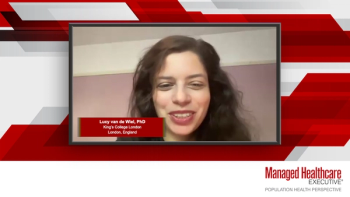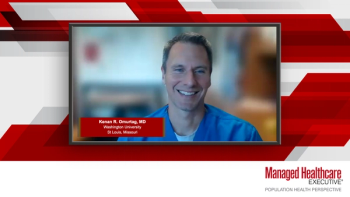The Impact of Health Benefit Design on Assisted Reproductive Technology (ART) Utilization and Pregnancy-Related Outcomes

Jeffrey Dunn, Pharm.D., MBA, discusses how comparison trials for different assisted reproductive technologies (ARTs) are necessary to evaluate their relative efficacy, safety and cost-effectiveness, with specific focus on a trial comparing highly purified human menotropin (HP-hMG) and recombinant follicle-stimulating hormone (FSH), as well as a study examining the impact of health benefit design for ART on pregnancy outcomes.

The key opinion leader discusses how criteria for assisted reproductive technology (ART) coverage are established, including stepwise approaches and considerations for mixed protocols, while emphasizing the importance of collaboration between providers and payers to ensure patient access to various ARTs.

Jeffrey Dunn, Pharm.D., MBA, discusses how the overall issues for assisted reproductive technologies (ARTs) encompass a range of challenges, including access, affordability, efficacy and ethical considerations, and the need for continued research and improvement in treatment protocols

A key opinion leader discusses how comprehensive fertility/ assisted reproductive technology (ART) programs should include a range of services to provide holistic care for individuals and couples seeking to conceive.

Jeffrey Dunn, Pharm.D., MBA, discusses how social determinants of health and population health factors are integrated into decision-making processes for fertility treatments and assisted reproductive technology (ART) programs to ensure equitable access and improve overall outcomes across diverse patient populations.

A medical expert in infertility discusses how best practices in communicating benefits for fertility treatments and assisted reproductive technology (ART) programs involve clear, concise and accessible information delivery and tailoring messages to diverse patient populations to ensure comprehensive understanding of coverage options and treatment processes.

Jeffrey Dunn, Pharm.D., MBA, discusses how quality measures, benchmarking and key performance indicators play a crucial role in their daily work by guiding decision-making, improving patient outcomes and ensuring the continuous enhancement of fertility treatment and assisted reproductive technology (ART) program effectiveness.

Jeffrey Dunn, Pharm.D., MBA, discusses how key unmet needs in assisted reproductive technology (ART) programs drive ongoing research and innovation, fostering hope for a future where fertility treatments are more effective, accessible and tailored to individual patient needs.

Lucy van de Wiel, PhD, discusses how infertility is defined as the inability to conceive after 12 months of regular unprotected intercourse, diagnosed through medical history, physical exams and tests, with risk factors including age, lifestyle habits and medical conditions.

Lucy van de Wiel, PhD, discusses how infertility often leads to psychological distress and depression in patients, with stress potentially exacerbating fertility issues and creating a challenging cycle that can negatively impact conception efforts.


Lucy van de Wiel, PhD, discusses how infertility can strain relationships between partners by causing emotional distress, communication breakdowns, sexual difficulties and feelings of blame or inadequacy, potentially leading to conflicts and decreased relationship satisfaction.

Lucy van de Wiel, PhD, discusses how in vitro fertilization (IVF) has evolved since its first successful use in 1978, initially targeting women with blocked fallopian tubes but expanding to address various fertility issues, including male factor infertility, unexplained infertility and genetic disorders, while also becoming more accessible to diverse patient populations including same-sex couples and single individuals.

Lucy van de Wiel, PhD, discusses how emerging technologies such as in vitro gametogenesis and gene editing show promise for addressing complex infertility cases, potentially revolutionizing reproductive medicine by offering new solutions for patients with genetic disorders, same-sex couples, and those with uterine factor infertility.

Kenan R. Omurtag, M.D., discusses how assisted reproductive technology encompasses various medical procedures like in vitro fertilization, intracytoplasmic sperm injection and gamete donation to help individuals or couples struggling with infertility achieve pregnancy through manipulation of eggs, sperm or embryos outside the body.

The panelist discusses how intrauterine insemination is typically considered for patients with unexplained infertility, mild male factor infertility or cervical factor infertility, while emphasizing the importance of careful patient selection, timing of the procedure and monitoring for potential complications.

Kenan R. Omurtag, M.D., discusses how less invasive fertility treatments like lifestyle modifications, ovulation induction and intrauterine insemination are typically attempted before progressing to IVF, which is often reserved for patients with severe male factor infertility, tubal factor infertility, advanced maternal age or those who have not succeeded with other fertility treatments.

The panelist discusses how intracytoplasmic sperm injection can be used in conjunction with in vitro fertilization (IVF) to directly inject a single sperm into an egg, thereby increasing fertilization rates and improving chances of successful pregnancy, particularly in cases of severe male factor infertility or previous IVF fertilization failure.

Kenan R. Omurtag, M.D., discusses how various ovulation stimulation treatments, including letrozole and gonadotropins, work through different mechanisms to promote follicle development and egg release, with considerations such as efficacy, side effects and risk of multiple pregnancies influencing the choice of treatment for individual patients.

The panelist discusses how vaginal insert and intramuscular progesterone supplementation can support early pregnancy by enhancing endometrial receptivity, maintaining the uterine lining and providing crucial hormonal support during the luteal phase and early weeks of gestation, thereby potentially increasing the chances of successful implantation and ongoing pregnancy in assisted reproductive technology cycles.

Kenan R. Omurtag, M.D., discusses how addressing unique needs of LGBTQ patients involves tailored fertility treatments and legal considerations, while emphasizing the importance of early fertility preservation counseling and expedited procedures for cancer patients, including cryopreservation of eggs, sperm or embryos prior to potentially gonadotoxic treatments.



